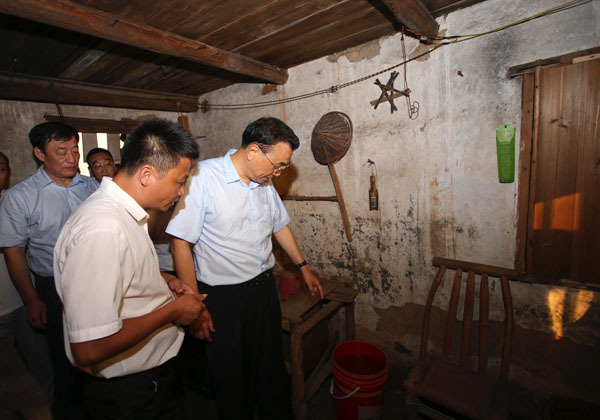Li: Infrastructure boost planned to aid rural Jiangxi
China Daily, August 23, 2016 Adjust font size:

Premier Li Keqiang goes to a villager's house during a visit to Ruijin city in East China's Jiangxi province, Aug 22, 2016. [Photo provided to chinadaily.com.cn]
Premier Li Keqiang vowed on Monday to further improve infrastructure such as highways and internet connections in impoverished regions of southern Jiangxi province, where the Long March started nearly 82 years ago.
The premier said the government will invest more in highways, power grids and irrigation facilities for the region, during a visit to the Aobeigang Production Base for navel oranges in the city of Ruijin in Ganzhou, Jiangxi.
The Communist Party of China established its first national government in Ruijin in 1931 and started the Long March in 1934 to establish new revolutionary bases in Northwest China's Shaanxi province.
Li's visit to the city follows the State Council's development plan for the region, released in 2012, which aimed to cultivate industries suitable for local conditions and improve rural infrastructure and farmers' living conditions by 2015.
Ganzhou produces 1.28 million metric tons of navel oranges each year, China's largest yield of the crop and accounting for 13.4 percent of the global production. Local official Chen Baofu said the production base was opened in 1994 and now covers over 1,000 hectares that have helped lift about 3,300 locals from poverty.
Li was pleased to hear that each hectare of these oranges can produce 120,000 yuan in income ($18,000) per year. Farmer Deng Zhuping earns more than 120,000 yuan net income annually with oranges from 1.2 hectares of rented land.
"The price of navel oranges has increased by more than 10 percent over the past few years," Deng said.
Some farmers said they have started to sell the fruit online, and the premier said more investments will be made to install faster internet connections in villages to support the farmers' commerce.
"I hope the internet will help you (farmers) sell oranges, and you should adopt delicacy management processes to produce high-quality goods that lead market demand and in turn create more profits," Li said.
The plan also encompasses providing safe drinking water, new houses, new schools and upgraded power grids in rural areas.
Li visited the village of Huawu, where 102 families moved into new homes built next to their shabby old houses with subsidies from the central government in 2014. Now farmers rent rooms to visiting tourists in their new homes.
"The area's economy lags behind that of the neighboring provinces of Fujian and Guangdong, due to disadvantages in transportation, talent and way of thinking. But it has great growth potential if the infrastructure improves," said Li Minghui, a researcher at the Chinese Academy of Agricultural Sciences.